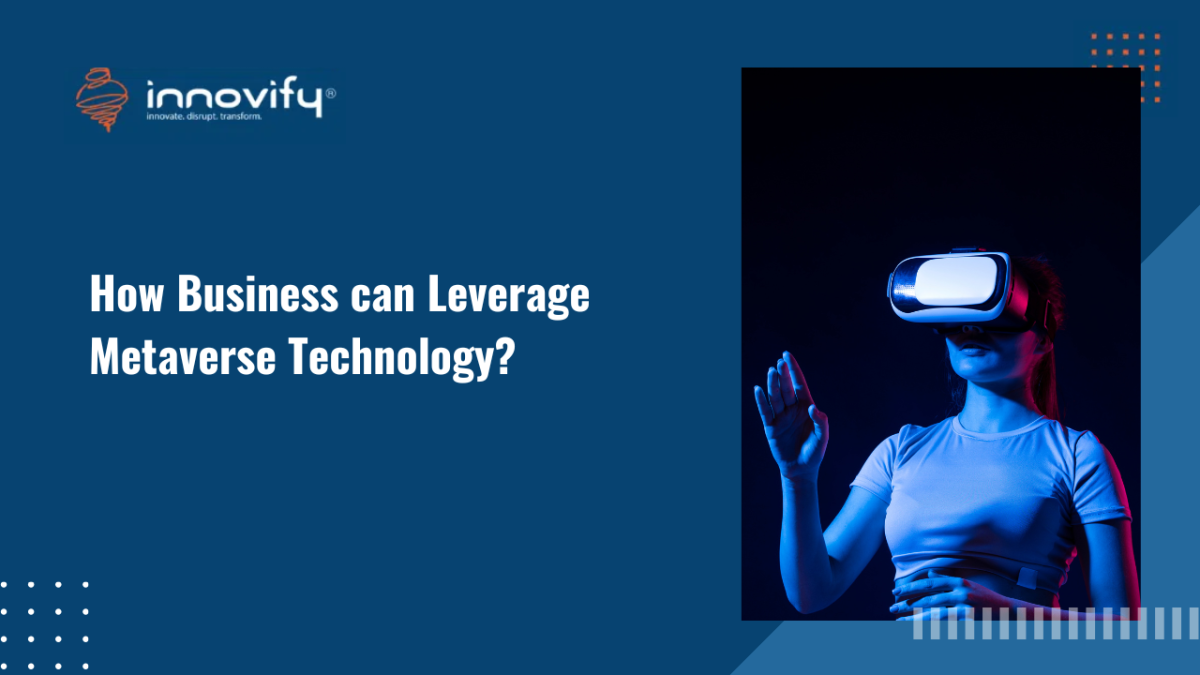AI/ML
How Business can Leverage Metaverse Technology?
What is the Metaverse?
The Metaverse is a term used to describe a hypothetical future iteration of the internet, where virtual reality, augmented reality, and other immersive technologies converge to create a shared online space that mimics the real world in some aspects.
It is envisioned as a fully immersive, interactive, and interconnected network of virtual worlds where users can interact with each other and with digital objects in real-time, using avatars or other representations of themselves.
In the Metaverse, users would be able to socialize, play games, attend events, conduct business, and even engage in virtual tourism or education. It is often described as a “parallel universe” or a “mirror world” that exists alongside the physical world, accessible to anyone with an internet connection and the necessary hardware and software.
Although the Metaverse is still largely a concept, many companies and organizations are currently working on building the foundational technologies and platforms that could make it a reality in the near future.
How Can Your Business Leverage the Metaverse Reality?
There are almost 3 billion monthly active users on Facebook, making it the world’s biggest virtual community. Meta has also announced its intention to develop a metaverse. However, the majority of us are unfamiliar with what a metaverse is or how it will affect the future.
The metaverse is envisioned as a new universe that would coexist with our physical world, not replace it. Instead of being a new location to own virtual property, it might be a new plane of existence in which we experience richer, more immersive experiences across multiple platforms. In return, marketers can follow the movements of customers and gather more meaningful data as a result.
The Power of the Metaverse: 5 Metaverse Benefits for Business
The Metaverse proposition is straightforward. It refers to making a company totally virtual. While in the past, the efforts might have been taking all operations offline and building up various automated systems online. But, in the metaverse, things will play out differently.
Although the complete shift to the metaverse will take up to a decade, it’s safe to say that ‘the future’ is closer than we think, given all the hype surrounding the metaverse and metaverse platforms like Decentralland already available.
So, what can businesses expect from the metaverse? What will be the new normal for them when the metaverse becomes a reality? Let’s find out.
1. Innovative Ways to Engage with Customers
Metaverses can provide businesses with more entertaining and immersive experiences, and you can take advantage of them to the fullest. As one of the first brands to provide a metaverse experience to customers, you will undoubtedly gain the first-mover advantage and attract attention.
You may use the metaverse to promote your brand through virtual goods, branded gaming adventures, and AR/VR showrooms. So don’t hesitate; get in touch with an interactive design company like us right away. Metaverse might become mainstream in customer communication soon.
2. Conduct Virtual Events
Live events, especially ones that include a virtual component, have been around for a long time. It is possible to participate without attending a professional conference or a lecture physically if you are unable to do so.
However, as opposed to a simple Zoom or Google Meet stream, or a video in a little window with comments below it, participants find a live lecture in the metaverse exciting. It can be a full-fledged VR experience in which people can network and participate properly.
Moreover, museums and galleries can also relocate to the metaverse. For instance, Sotheby’s announced an NFT avatar exhibition project exclusively available on the gallery’s metaverse, where 300 unique avatar items were sold in one day.
3. Showcase Products
Many brands are currently using AR to let their clients try on clothing or glasses, see how new furniture would fit in their room, or get a virtual makeover with a new hairdo or makeup. Metaverse experiences will be identical but better.
You can even establish stores and display spaces in the metaverse to let users examine your products. Even today, digital fashion is hot: people are actively buying virtual clothes and accessories, not to mention the virtual world of games. So imagine what will happen when the metaverse advances.
4. New Ways to Advertise
Storytelling is one of the most effective methods for establishing brand identity and awareness, and metaverse will bring in new methods for brand storytelling and advertising in general.
Advertising and storytelling are excellent ways to communicate a company’s values and mission statement. Can you imagine how exciting and immersive your brand story might be in the metaverse, where VR and other technologies are used?
We believe that storytelling will evolve into “storyliving”, in which users are no longer passive listeners but active players or characters who are making choices and influencing the plot.
5. Enable Greater Team Collaboration
Despite being thrust upon many of us, online meetings and remote teamwork are proving just as effective as an office environment. The metaverse can potentially be used to enhance work processes and employee experience even more. These meetings would feel like a group of people sitting in one room rather than a Zoom call. The best part is Meta has already released VR workrooms.
Alright, the benefits of the metaverse seem promising enough for businesses. But how can they onboard the metaverse cruise?
Embracing the Metaverse: 6 Steps to Get Your Business Ready
Following are the steps to get your business ready for the new normal:
1. Know Your Niche
Metaverses—the idea of connecting people via technologies like virtual and augmented reality—have been around for decades, at least to some degree. Zuckerberg and his omniscient company claim that it is the future, but this idea has been around for a long time. Metaverses, which link people to one another virtually, emerged as a result of online message boards in the late 1980s and early 1990s, which did the same thing.
It’s difficult to say when the metaverse idea was first raised, as it is to establish a common understanding of what it means for us now. To make sure your small business is ready for the digital revolution, you must define a product roadmap to first determine what you want for your business and how you can harness technology to achieve it.
Every firm has a unique purpose for using metaverse technology. For one startup, it can be about designing better AI to answer customers’ queries on-site. For another, it can be about creating an entire virtual world where customers can virtually experience products as if they were really there with them.
Only you can determine how the metaverse can assist your organization—and this is critical to understand before you start your metaverse journey.
2. Think About Rebranding
New technology initiatives and social platforms offer new branding opportunities. This is the ideal time to evaluate your visual brand.
People adore the metaverse notion because of its emphasis on connectivity. In researching new digital businesses, one of the first things you should look for is messaging that emphasizes how critical communication is to your venture. It’s one of the metaverse’s founding values, and it should be front and center in your branding as well.
Consider rebranding to reflect that value now, whether you need to update your existing visuals or create a logo using software from scratch. We strongly encourage using a brand identity guide for your company logo before we continue with the metaverse initiative.
3. Claim Your Business on Search Engine
It’s critical for a business to maintain a presence online in our day and age. Without it, you might lose out on traffic to your website or business, as well as risk annoying customers who can’t find the information they need.
Keeping the information up to date is equally important – ask anyone who drove to five different restaurants over the holidays because their Google profile said they were open.
Still, many businesses don’t claim and update their business on Google My Business, AKA Google Business Profile. However, you should be doing so anyhow before going all into the metaverse.
4. Continue Conventional Efforts
Indeed, we’re amidst a lot of change. A lot of customers may be eager to enter the metaverse soon. The future looks bright, but great business has always been about giving customers what they want. Most people aren’t ready for the launch quite yet, however.
Consider the numbers if you want reassurance that the Metaverse, Facebook’s augmented/virtual reality initiative that inspired their recent name change, is not as popular as the hype. In fact, 68% of those polled in a Morning Consult study said they were uninterested in engaging with it.
Even if you are preparing for the future, don’t forget the old ways. Many of your customers really love them. Therefore, allow your customer to engage with your brand in more traditional ways.
5. Be Ready for Unknown
The next step is to know that no matter how well you prepare for the future, you should always be prepared for the unknown.
We’ve been through a lot of unpredictables in our decade of the startup journey, and we always advise people to be prepared for more or the same. A lesson we’ve learned is when things get comfortable, that’s when we should be wary.
Yes, in the broader perspective, we have a bright future ahead of us, where we will become even more technologically oriented. But don’t get so preoccupied with tomorrow’s virtual reality project that you miss what’s coming up next week.
Big changes are certainly coming our way. Your business may survive the alterations over the next decade, but at the very least, you should be prepared for what’s next.
6. Prepare Your Digital Infrastructure
Many firms, even technology companies, lack the institutional knowledge or skills to properly understand and trust their digital transactions and investments. The metaverse’s concepts are also rapidly changing, and many may not even understand them.
Hence, you should assign a resource or source of knowledge (for example, a group) to keep up with key concepts such as cryptocurrencies and decentralized autonomous organizations and their significance to your organization, as well as to follow the metaverse as it evolves.
Moreover, companies will be able to build enterprise or marketing applications on metaverse concepts and identify gaps to close by identifying which technical measures are needed to support them.
For example, by recruiting employees who are already familiar with mobile app development trends related to metaverse concepts, as well as by making services extensible, publishing application programming interfaces (APIs) to core systems, and developing security and identity plans, many companies will be able to take advantage of the metaverse in the mobile app development space.
What’s the Nearest Metaverse Reality for Businesses?
Today, there are a few opportunities that can be seized as part of the metaverse’s underlying trends.
Selling digital copies of physical products, offering virtual experiences of virtual products or facilities, or creating NFTs to boost brand recognition and consumer connections are all lower-risk applications. Companies may also want to purchase or lease digital property for sale, advertising, and customer support.
Because no individual digital worlds have demonstrated sustained importance, digital real estate is a higher-risk choice, but it may be a reasonable alternative for some firms.




